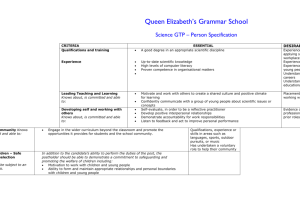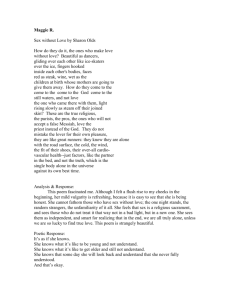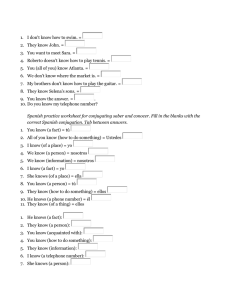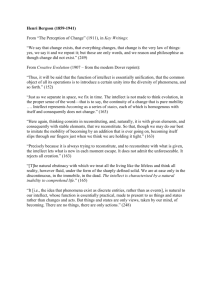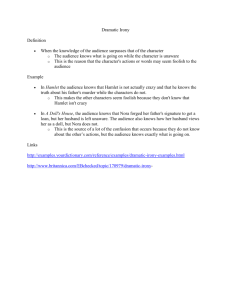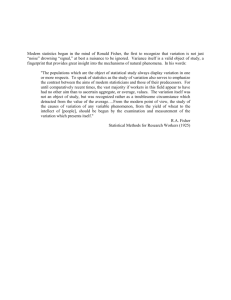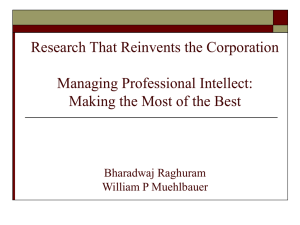mere application - The Critical Thinking Community
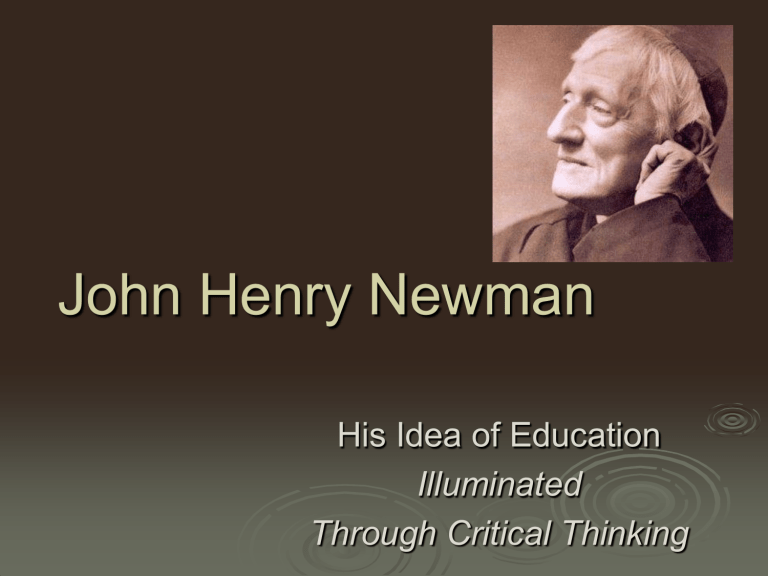
John Henry Newman
His Idea of Education
Illuminated
Through Critical Thinking
Two-fold purpose :
to explore with you some of the deep insights implicit in Newman’s conception of education, as detailed in his discourses.
to illuminate the fact that many of these insights can be articulated using critical thinking concepts and principles (and thus made explicit in the mind).
Education is a high word; it is the preparation for knowledge, and it is the imparting of knowledge in proportion to that preparation. We require intellectual eyes to know withal, as bodily eyes for sight. We need both objects and organs intellectual; we cannot gain them without setting about it; we cannot gain them in our sleep, or by hap-hazard (p.
104).
It is education which gives a man a clear conscious view of his own opinions and judgments, a truth in developing them, an eloquence in expressing them, and a force in urging them. It teaches him to see things as they are, to go right to the point, to disentangle a skein of thought, to detect what is sophistical, and to discard what is irrelevant. It prepares him to fill any post with credit, and to master any subject with facility. It shows him how to accommodate himself to others, how to throw himself into their state of mind, how to bring before them his own, how to influence them, how to come to an understanding with them, how to bear with them..
...he knows when to speak and when to be silent; he is able to converse, he is able to listen; he can ask a question pertinently, and gain a lesson seasonably, when he has nothing to impart himself (p. 126).
Truth, of whatever kind, is the proper object of the intellect; its cultivation then lies in fitting it to apprehend and contemplate truth... the intellect in its present state, ...does not discern truth intuitively, or as a whole. We know, not by a direct and simple vision, not at a glance, but, as it were, by piecemeal and accumulation, by a mental process, by going round an object, by the comparison, the combination, the mutual correction, the continual adaptation, of many partial notions, by the employment, concentration, and joint action of many faculties and exercises of mind.
Such a union and concert of the intellectual powers, such an enlargement and development, such a comprehensiveness, is necessarily a matter of training. And again, such a training is a matter of rule; it is not mere application , however exemplary, which introduces the mind to truth, nor the reading of many books, nor the getting up of many subjects, nor the witnessing many experiments, nor attending many lectures.
All this is short of enough; a man may have done it all, yet be lingering in the vestibule of knowledge: he may not realize what his mouth utters; he may not see with his mental eye what confronts him; he may have no grasp of things as they are; or at least he may have no power at all of advancing one step forward of himself, in consequence of what he has already acquired, no power of discriminating between truth and falsehood, of sifting out the grains of truth from the mass, of arranging things according to the their real value.
Such a power is an acquired faculty of judgment, of clearsightedness, of sagacity, of wisdom, of philosophical reach of mind, and of intellectual self-possession and repose - qualities which do not come of mere acquirement. The eye of the mind, of which the object is truth, is the work of discipline and habit (p. 109).
That perfection of the Intellect, which is the result of Education, and its beau ideal , to be imparted to individuals in their respective measures, is the clear, calm, accurate vision and comprehension of all things, as far as the finite mind can embrace them, each in its place, and with its own characteristics upon it. (p. 100).
I will tell you, Gentlemen, what has been the practical error of the last twenty years – not to load the memory of the student with a mass of undigested knowledge, but to force upon him so much that he has rejected all. It has been the error of distracting and enfeebling the mind by an unmeaning profusion of subjects; of implying that a smattering in a dozen branches of study is not shallowness, which it really is, but enlargement, which it is not; of considering an acquaintance with the learned names of things and persons, and the possession of the clever duodecimos, and attendance on eloquent lecturers, and membership with scientific institutions, and the sight of the experiments of a platform and the specimens of a museum, that all this was not dissipation of mind, but progress.
All things now are to be learned at once, not first one thing and then the other, not one well, but many badly. Learning is to be without exertion, without attention, without toil; without grounding, without advance, without finishing. There is to be nothing individual in it; and this, forsooth, is the wonder of the age. What the steam engine does with matter, the printing press is to do with the mind; it is to act mechanically, and the population is to be passively, almost unconsciously enlightened (p. 103).
I say then, if we would improve the intellect, first of all, we must ascend; we cannot gain real knowledge on a level; we must generalize, we must reduce to method, we must have a grasp of principles, and group and shape our acquisitions by means of them (p. 100).
All I say is, call things by their right names, and do not confuse together ideas which are essentially different. A thorough knowledge of one science and a superficial acquaintance with many, are not the same thing; a smattering of a hundred things or a memory for detail, is not a philosophical or comprehensive view. Recreations are not education; accomplishments are not education.
Do not say, the people must be educated, when, after all, you only mean, amused, refreshed, soothed, put into good spirits and good humour, or kept from vicious excesses. I do not say that such amusements, such occupations of mind, are not a great gain; but they are not education.
That only is true enlargement of mind which is the power of viewing many things at once as one whole, of referring them severally to their true place in the universal system, of understanding their respective values, and determining their mutual dependence. Thus is that form of Universal Knowledge, of which
I have on a former occasion spoken, set up in the individual intellect, and constitutes its perfection. Possessed of this real illumination, the mind never views any part of the extended subject-matter of Knowledge without recollecting that it is but a part, or without the associations which spring from this recollection.
[A lecture] is a case of contract “I will speak if you will listen.” “I will come here to learn if you have anything worth teaching me.” Effort is shared between two parties who cooperate toward a common end. Then the effect is the slow silent, penetrating, overpower, effects of patience, steadiness, routine, and perseverance (p. 493)…a secret gradual movement going on and a specific form of attraction and a drifting and accumulation which at length makes itself felt and cannot be mistaken. (p. 493)
It makes every thing in some sort lead to every thing else; it would communicate the image of the whole to every separate portion, till that whole becomes in imagination like a spirit, every where pervading and penetrating its component parts, and giving them one definite meaning…in the mind of the
Philosopher, as we are abstractedly conceiving of him, the elements of the physical and moral world, sciences, arts, pursuits, ranks, offices, events, opinions, individualities, are all viewed as one, with correlative functions, and as gradually by successive combinations converging, one and all, to the true centre. (pp. 99-100).
The intellect, which has been disciplined to the perfection of its powers, which knows, and thinks while it knows, which has learned to leaven the dense mass of facts and events with the elastic force of reason, such an intellect cannot be partial, cannot be exclusive, cannot be impetuous, cannot be at a loss, cannot but be patient, collected and majestically calm, because it discerns the end in every beginning, the original in every end, the law in every interruption, the limit in each delay; because it ever knows where it stands, and how its path lies from one point to another (p. 100).
To have even a portion of this illuminative reason and true philosophy is the highest state to which nature can aspire, in the way of intellect; it puts the mind above the influences of chance and necessity, above anxiety, suspense, unsettlement, and superstition, which is the lot of the many. Men, whose minds are possessed with some one object, take exaggerated views of its importance, are feverish in the pursuit of it, make it the measure of things which are utterly foreign to it, and are startled and despond if it happens to fail them. They are ever in alarm or in transport.
Writing is a stimulus to the mental faculties, to the logical talent, to originality to the power of illustration, to the arrangement of topics second to none, till a person begins to put down his thoughts about a subject on paper, he will not ascertain what he knows and what he does not know; and still less will he be able to express what he does know (p. 422)
Those on the other hand who have no object or principle whatever to hold by, lose their way, every step they take.
They are thrown out, and do not know what to think or say, at every fresh juncture; they have no view of persons, or occurrences, or facts, which come suddenly upon them, and they hang upon the opinion of others, for want of internal resources.
But the intellect, which has been disciplined to the perfection of its powers, which knows, and thinks while it knows, which has learned to leaven the dense mass of facts and events with the elastic force of reason, such an intellect cannot be partial, cannot be exclusive, cannot be impetuous, cannot be at a loss, cannot but be patient, collected, and majestically calm, because it discerns the end in every beginning, the origin in every end, the law in every interruption, the limit in each delay; because it ever knows where it stands, and how its path lies from one point to another. (p. 100)
The position of our mind, as far as they are uncultivated toward intellectual objects – I mean of our minds, before they have been disciplined and formed by the action of our reason upon them – is analogous to that of a blind man toward the objects of vision…the multitude of things which present themselves to the sight under a multiplicity of shapes and hues (p. 495).
Reflect, Gentlemen, how many disputes you must have listened to , which were interminable, because neither party understood either his opponent or himself.
Consider… the need there so frequently is, not simply of some clear thinker to disentangle the perplexities of thought, but of capacity in the combatants to do justice to the clearest explanations which are set before them…Now a person who knows his ignorance will say,
“These questions are beyond me,” and he tries to gain a clear notion and a firm hold of them; and if he speaks, it is as investigating, not as deciding (pp. 498-499).
It shows him how to accommodate himself to others, how to throw himself into their state of mind, how to bring before them his own, how to influence them, how to come to an understanding with them, how to bear with them.
He is at home in any society, he has common ground with every class; he knows when to speak and when to be silent; he is able to converse; he is able to listen; he can ask a question pertinently, and gain a lesson seasonably, when he has nothing to impart himself (p. 178).


